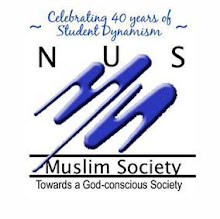Muslim Youth Intelligentsia Series 2008
Reading Circles June
PERSONAL RELIGIOUS ORIENTATIONS: RECONCILING THE DIFFERENCES: A REVIEW.
The presentation by Ustaz Haniff on the above topic, during the last RC, emphasized on the need to recognize, accept, and live with differences that exist, especially, among the Muslims as far as our diversed sectarian orientations are concerned. This message was put across by highlighting on four key issues:
i) That, diversity is natural.
ii) That, differences in opinions are caused by some factors such as, the nature of the Quran texts, language being finite, Satan’s influence, and tools of interpretations used.
iii) That, there is a possibility of having more than one truth, and finally
iv) The need to be cautious of absolutism on some issues.
The presentation was well thought out and insightful. In fact, such delicate, and sensitive topics as this, needs careful handling, and that was exactly what the presenter did. This review is not an attempt to summarise the session nor is it to propose how to deal with diverse religious orientations, nonetheless, it is an attempt to recapitulate some key issues raised by the presenter, and to look at some concerns raised, or that might be linger in the minds of the listener/reader regarding those key issues.
First, that diversity is natural. This point is supported by some evidences in the Quran (like 49: 13). Apparently, not even the most identical twins act and think alike. It is therefore necessary to accept what is natural, because it is beyond our control, and to also learn how to deal with it rationally and peacefully. An eyebrow might be raised here, by inquiring if accepting and living with differences is an attempt to homogenise the ummah. It is obvious, that homogenising the ummah will not only be impossible, but also against Allah’s design. It is a call to live by the principle of: “agreeing to disagree” or “unity in diversity” as mentioned in the session.
Another concern that might be raised is the fact that, if diversity is natural; does that mean accepting religious sectarianism within Islam, whilst the source of Islam is one. It’s worth noting that sectarianism in Islam does not affect the originality of Islam, but a manifestation of how diversified humans are. Islam is a holistic way of life, which people have agreed to live by. In their attempt to understand, and practice its teachings they differ in comprehension and opinion. It is complete, and it’s being protected by Allah as evident in the Quran.
Now, what might precipitate differences in opinions? This question brings to the forefront, the second key issue mentioned in the session. The nature of the verses of the Quran. There are many Quranic verses that are of sufficient ambuiguity as to, allow for multiple interpretations according to unique situations and contexts. These are known as the “zhanni” verses. They can lead to differences in opinions. Furthermore, the inability of language, as a human construct, to fully grasp the meaning of the Quran is also a considerable factor. Another factor is the tools used (like “ahadeeth”) in interpreting verses of the Quran, and finally the influence of Satan on the interpreter.
The finiteness of language becomes more evident when translating the Arabic text into other languages, like English. Most Arabic words have no exact synonyms in English, but only words which are equivalent in meanings. This tends to create “inaccurate translations”. This raises some mind boggling questions: who qualifies to interpret/translate the Quran? A related question is: who determines who interprets Quran? These are not meant to be answered here, but food for thoughts.
In fact, intimately connected to the above is the question of which interpretation(s) are to be accepted. This brings to light the issue of multiple truths raised during the circle. While there are multiple truths on some issues, there are also single truths on other issues. A concern raised by a participant is the fact that; how does one discern the truth? This might require deep spirituality, knowledge and analytical skills. What then is the plight of those of us who lack these? This is an issue of great concern, because such individuals can easily be swayed to stick the wrong interpretation. Another concern here might be: is there any yardstick against which one measures an interpretation for consideration of acceptance or rejection?
The final point highlighted was the cautiousness of absolutism. Taking such caution is crucial in that, absolutist position on some issues can be improperly grounded. Taking absolutist position, on issues that need not be dealt with as such, might lead to the ‘holier than thou attitude’. The Quran cautions against this in various verses. It cautions that we shouldn’t praise ourselves of being pious because it is Allah who knows who has ‘taqwa’ (i.e. piety) (53:32). Again, in another verse, it states that each one of us does according to “shakilatihi”, (i.e. his way, intensions, religion etc) and that it is only Allah who knows whose path is right (17:84). An issue of concern here will be that: what if based on evidences we realised that someone is going against orthodox Islam? Will humble and beautiful reminder be helpful?
On the whole, participants supported the view that there is a need to recognize, accept and live with differences, but this isn’t without difficulty. One participant raised the issue of Sunnis and Shiites and another raised some issues regarding sects within the Sunni sect. Now, when discussing religious orientations or sects, are we talking about the ‘sub-sects-within- sect” or “cross sects”?[1] Highlighting this dichtomy is crucial becaus the various sub-sects within a sect have much more substantial common grounds as compared to the commoanlities between differing sects. Thus differences across sub-sects are generally on trivial matters. What unites them is of greater significance than what divides them. However, as for the cross-sects, there remains to be outstanding grievous issues that are yet to be resolved.
Another related concern is to what extent does one accept and tolerate differences. Should we accept any difference and live by it? Or there should be such a point in time where we create a suitable platform to advise each other in truth? Will it be possible to consider dialoguing and presenting our “daleel” (strong evidence) to each other for consideration? This is especially so when what a sect is doing is clearly against orthodox Islam.
In any case, care should be taken when dealing with sectarianism because the Quran hints that, Allah can make friendship between you and those you hold as enemies, and that Allah has not forbid you to deal justly and kindly to those who have not fought you, and derived you out of your homes on account of religious differences (60: 7-8).If this verse is applicable to non Muslims, what about a fellow Muslim who is only in a different sect?
Islam frowns upon segregation and intolerance, especially, among Muslims, but Muslims today are the most divided of all and intolerant when it comes to sectarian issues within Islam itself. Though Sectarianism[2] in Islam is mostly caused by trivialities, but it has eaten deep into the Muslim ummah such that it sometimes leads to “takfiir” (a Muslim calling the other kaafir).Sessions such as the one held on the above topic needs to be encouraged, so as, to create a platform where Muslims understand, appreciate, and tolerate differences that exist among themselves regarding diverse sectarian orientations. Dialoguing among sects can be integrated, so as, to understand each others’ reasons and supporting evidences for doing what they do. This might prevent blind condemnations and perhaps provide a platform for advising each other in truth.
[1] Sects-within –sect refers to the sub-sects that exist under an umbrella sect. like sub sects under Shiite or Sunni. But cross sect refers to say, Sunni and Shiite or Ahmadiyya.
[2] Sectarianism here refers to the ‘sects-within sect’ category and not ‘cross- sect’. Consider for instance, wahabis and salafis under the Sunni sect.



No comments:
Post a Comment